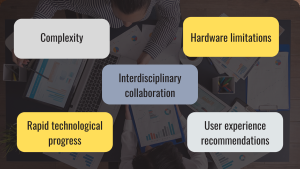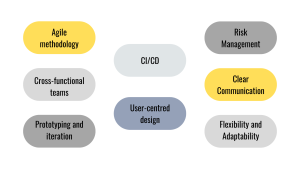content
Bespoke Software Development
May 21, 2024
6 min read
Introduction
In today’s fast-paced technology environment, traditional approaches to software development are no longer sufficient to keep pace with innovation. Enter a cutting-edge development environment – a blend of human expertise and machine intelligence that promises unprecedented levels of productivity and creativity. However, navigating this difficult terrain requires more than just technical skills; it requires effective project management strategies adapted to the unique challenges and opportunities that augmented development presents.
Understanding Augmented Development Environments
Augmented development environments represent a convergence of advanced tools, automation, and artificial intelligence to empower software development teams. Using technologies such as machine learning, natural language processing, and automated testing, teams can streamline workflows, accelerate development cycles, and deliver higher-quality products.
At the heart of every successful augmented development is effective project management. Project managers act as coordinators of innovation, ensuring that teams remain focused, aligned, and adaptive throughout the development process. Their responsibilities cover everything from resource allocation and risk management to stakeholder communication and performance tracking.
Challenges in Project Management

- Complexity. Advanced development projects are inherently complex due to the integration of software, hardware, and user experience components. Managing dependencies and ensuring smooth integration can be challenging.
- Rapid technological progress. The technology landscape is rapidly evolving, introducing new tools, platforms and frameworks. Project managers need to stay abreast of these advances to make informed decisions.
- Interdisciplinary collaboration. Effective collaboration between different teams with different backgrounds is critical. Project managers must facilitate communication and ensure alignment with project goals.
- Hardware limitations. Augmented reality projects often rely on hardware devices with accessibility capabilities. Managing compatibility and performance between devices adds another layer of complexity.
- User experience recommendations. An improved interface is largely dependent on user interaction and immersion. The balance between technical requirements and user experience considerations is essential to the success of a project.
Strategies for Effective Project Management

- Agile methodology: Agile methodologies such as Scrum or Kanban are well suited for extended development projects. They emphasise iterative development, allowing teams to adapt to changing requirements and technological advances.
- Cross-functional teams: Form cross-functional teams made up of members with different skill sets. Encourage collaboration and knowledge sharing to promote innovation and solve problems.
- Prototyping and iteration: Rapid prototyping and iteration are necessary to test concepts and gather feedback early in the development process. Use tools like Unity or Unreal Engine for rapid prototyping.
- Continuous Integration and Deployment (CI/CD): Implement CI/CD pipelines to automate build, test, and deployment processes. This ensures faster delivery cycles and helps maintain product quality.
- User-centred design: Focus on user experience design. Conduct user research, usability testing, and iterate based on feedback to create an immersive and intuitive experience.
- Risk Management: Identify potential risks early in the project life cycle and develop mitigation strategies. Proactively resolve technical issues, dependencies, and resource constraints to minimise project delays.
- Clear Communication: Establish transparent communication channels within the team and with stakeholders. Communicate project status, updates, and issues regularly to ensure consistency and manage expectations.
- Flexibility and Adaptability: Remain flexible and adaptable to change throughout the project lifecycle. Embrace uncertainty and encourage a culture of experimentation and learning.
Conclusion
Effective project management is the key to success in advanced development environments, where the combination of human ingenuity and technological innovation promises dramatic change. By applying agile methodologies, encouraging collaboration, leveraging data analytics, prioritising continuous learning, and fostering a culture of innovation, project managers can confidently navigate the complexities of progressive development and drive their teams to greater heights of achievement.
If you have any questions or an idea for a software development project, contact us via sales@instandart.com or fill out the form on the main page of the site to discuss. We are always ready to help!
